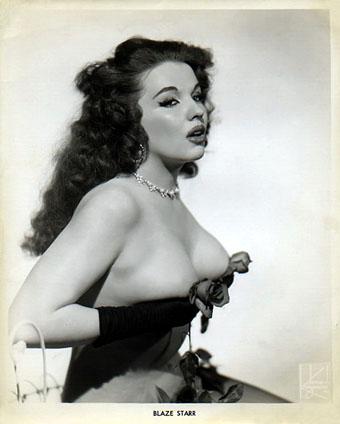If you ever had the opportunity to sit within a couple of feet of Blaze Starr, the legendary queen of burlesque and long-time Baltimore legend, proprietor of the 2 O’Clock Club on a certain block of East Baltimore Street, you knew you were eye-to-eye with an American original.
Starr, who died Monday at her home in Wilsondale, West Virginia, was probably the last big star of what was loosely known as the world of burlesque, in which comedians told baggy-pants jokes, and young women with outsized personalities and physical attributes shed their clothes to thumping music and outrageous stage gimmicks.
Starr had the personality, and then some, and the attributes, and then some. But what she also had was a sense of humor, smarts, business acumen, a charitable streak and a propensity to get involved with major politicians, much to her own considerable pain, but also gain, in the sense of notoriety.
This from a girl who was born Fannie Belle Fleming, one of 11 children in a place that was so small that it wasn’t even a place, along Twelvepole Creek in Mingo County.
Fannie Belle ran away from home and ended up in Washington, D.C., working at the Mayflower Donut Shop. But soon enough, in spite of a lot of trepidation, she was lured into stripping for a living, and, given her genuine curvy beauty, was a major success.
Then, while working at the Sho-Bar on Bourbon Street in New Orleans, she met Louisiana Governor Earl Long, brother of former governor, then senator and assassination victim, Huey Long. Their affair, which lasted until his death in 1960, was chronicled in the 1989 Ron Shelton-directed movie “Blaze,” starring Lolita Davidovich as Starr and Paul Newman, no less, as Earl Long. The movie captured not only her dramatic life, but also American, and particularly Southern, attitudes about sex, sin, religion and, of course, politics.
Starr began stripping at the 2 O’Clock Club on Baltimore’s notorious “Block” in 1950, eventually buying the place and becoming a much-beloved citizen. The proof in the pudding is the mournful tone and praise in the Baltimore Sun obituary, in which Shelton, a former Baltimore mayor and another Baltimore iconoclast, John Waters, waxed nostalgic about Starr.
This writer, working on assignment for The Georgetowner, had occasion to interview her when she was still stripping in 1980 at the Silver Slipper in Washington, one of the last genuine burlesque houses in the city, famous as the joint where House Ways and Means Committee Chairman Wilbur Mills met one Fanne Foxe, who worked there.
After watching Starr do her “Miss Spontaneous Combustion” act, in which a red bed exploded into smoke and fake flames while she writhed thereupon, we talked to her in her dressing room. Up close, Starr turned out to be funny, unassuming, a little flirty (like a guy running an engine to make sure it was still running properly), vivacious, smart and blunt. Her memoir, “Blaze Starr: My Life as Told to Huey Perry,” published in 1974, was still being peddled.
I told her about a 1950s rite of passage in small town America, in which I and some of my high school friends had gone to Cleveland to the Roxy Burlesque to see a show. We might even have seen her there. By present standards, this was tame but titillating stuff: baggy-pants comedian, popcorn and skin magazines, G-strings and pasties and a burning red spotlight.
“Aw, Honey, it’s gone you know,” she said. “The last time I was there, I walked in there and they had the big posters of me up there, bigger than life. Next day, they were gone and the wreckers came.”
She bemoaned the ongoing passing of her profession. “It’s the movies that’s doing it. If they’ve seen everything, they don’t want to see you peeling off a glove.”
One of her dates was Frank Rizzo, ex-mayor of Philadelphia. When we mentioned his name, she didn’t pull punches. “That S.O.B.,” she said then. He “had me thrown in jail, but he’d see me as long as nobody would see us. I never forget being treated like that. People told me I got a memory like an elephant.”
It was never serious stuff with her — “I couldn’t do it if it was” — it was a bit of a wink and a joke, with a lot of enthusiasm and energy.
“Up there, with the makeup and the lights and the dresses and wigs, that’s Blaze Starr. That’s an act. Inside, I know who I am. I’m Lora Fleming from Mingo County.
She was and remains a lot more than that.
And right now, somewhere, the big red light goes on and the drums are pounding and it’s: “Ladies and Gentlemen, Miss Blaze Starr!”


